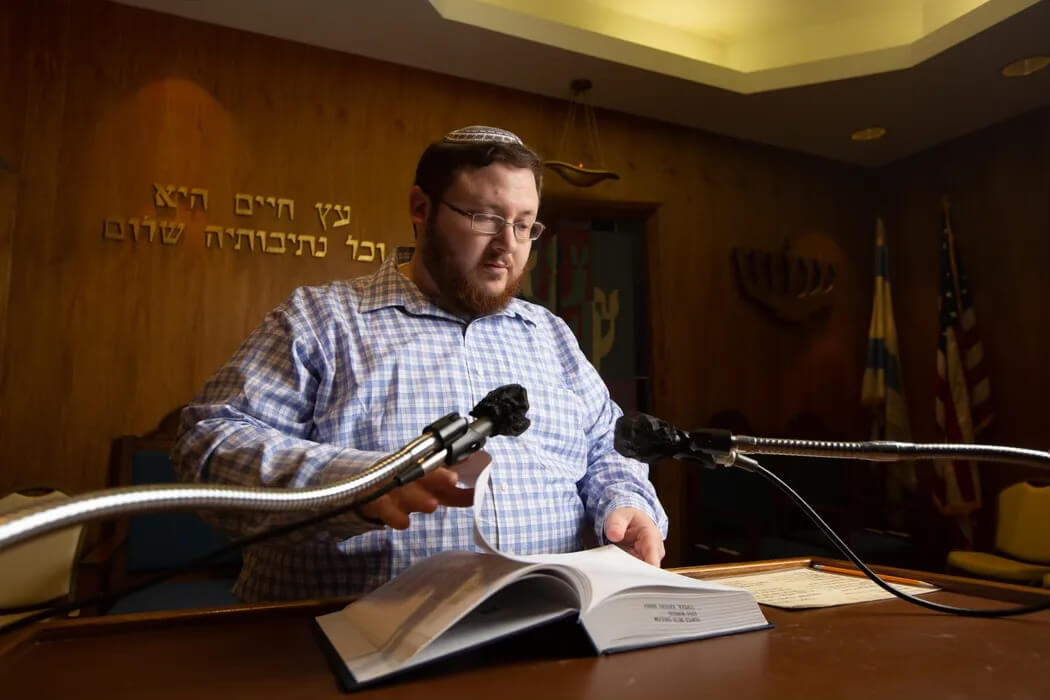How a heartland rabbi is helping congregants connect to Israel this Shabbat
In Topeka, Kansas, a Jewish community of a few hundred people unites to ‘feel less alone’

Rabbi Samuel Stern at Temple Beth Sholom in Topeka. Courtesy of Samuel Stern
Rabbi Samuel Stern is expecting a bigger Friday night crowd than usual at his Reform synagogue in Topeka, Kansas. His congregants want to pray for Israel.
So, Stern is changing Temple Beth Sholom’s Kabbalat Shabbat service to deepen the connection between prayer and patriotism.
“It’s kind of a reestablishment of not just an Israeli identity for some people but a Jewish identity for them as well,” Stern, 35, said Thursday in a phone interview. “There’s a greater sense than ever that these things are inherently linked.”
He’s adding in music from Israeli composers and liturgical poems by Hannah Senesh, who immigrated to Mandatory Palestine in 1941 but returned to Europe to save Jewish lives, and the Zionist writer Nathan Alterman. He’ll move the prayers for the state of Israel and the IDF, typically recited on Saturday, to the night before.
Beth Sholom is one of many congregations across the country that are trying to help their members grapple with the tragedy that unfolded over the weekend, when Hamas killed at least 1,200 Israelis, and the war that ensued, which has already claimed 1,400 Palestinian lives. Owing to Hamas’ call for a global day of jihad on Friday, Stern said, “we’ve had to hire extra security.”
(The Secure Communities Network, which protects Jewish communities, said in a briefing Thursday afternoon that it was not at the moment aware of any credible threats against Jewish institutions in the U.S.)
Many of the 110 member families at Beth Sholom are just a degree or two of separation away from people killed or missing in the Hamas attacks. Only one member of the community is Israeli, Stern says, and that congregant called him earlier this week.
“He was hoping we were going to do something like this,” Stern said. “He said, ‘You know, I really feel it’s important for me to be there.’”
Less alone
Topeka’s Jewish community dates back to the mid-19th century, but today it is largely confined to Stern’s synagogue, and is only a few hundred people. For that reason, Stern said they sometimes feel like an island in a Christian sea.
Since the attacks on Israel on Saturday, however, churches in the area have sent messages of solidarity.
“Every bit of support we get helps us feel less alone,” said Stern.
He’s planning on using his sermon time to hold an open discussion for congregants to talk about how they’re feeling about and processing current events.
And while he wants to use his pulpit to “get facts out there” about the situation in Israel, he said he would not make any statements to his congregation about casualties in Gaza.
“While I deplore the loss of any civilian life, including Palestinians living in Gaza, Hamas, because of the nature of their warfare, their terrorism — because of how they hide themselves under hospitals and schools — any way that Israel needs to respond to wipe out Hamas will inevitably, sadly cause civilian casualties,” Stern said.
“I’m sorry that any civilian has to lose their lives, but we believe morally that any death in this conflict on the Palestinian side is attributable to Hamas.”






















